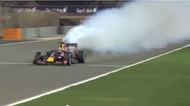Red Bull team principal Christian Horner said in an interview yesterday that Renault, who supply engines to Red Bull and sister team Scuderia Toro Rosso, may leave Formula One.
The team have been suffering with impaired power units, with bosses and drivers equally unhappy with the manufacturers, and vocally so. Earlier this year, the team threatened to withdraw their sponsorship from the engine manufacturer altogether.
In early April, Red Bull boss Dietrich Mateschitz was quoted earlier this month by the Austria Press Association, the home country of Red Bull, as saying the team would “..only stay in Formula 1 if we have a competitive team, and we need a competitive power unit for that.”
Horner and Mateschitz however, when questioned about whether they were looking to break away from Renault, had then replied in the negative.
Engine trouble galore
Australian Red Bull driver Daniel Ricciardo is currently on his fourth and final engine after several failures and isssues over the 2015 racing season. He lost one at the Shanghai Grand Prix in China, a precautionary measure between qualifying and the race. The Shanghai Grand Prix was a particularly bad one for the teams on Renault power units – Ricciardo was forced to replace the unit after problems with the internal combustion. Kvyat encountered a smoking engine during the race itself, calmly telling pit crew over the radio “I’m on fire”.
Toro Rosso driver Max Verstappen had electrical problems not long after, and retired from the race as well.
Ricciardo also lost an engine at the Australian Grand Prix following a practice session, and finished the Bahrain Grand Prix at Sakhir in dramatic fashion, passing the chequered flag in 6th with smoke billowing from the engine.
Bosses unhappy with FIA rules
Team chief Helmut Marko was also unhappy, saying the team “wasn’t good enough”, and that they were “significantly behind Mercedes” in terms of Red Bull Racing’s power unit. Rumours were rife at the time that Audi were considering an entry into Formula One, and that they would manufacture the power units for Red Bull and Toro Rosso – rumours that were swiftly denied in succession by Red Bull bosses and the Chairman of Audi.
The contract between Red Bull and Renault runs thorugh to 2016, although Renault admits its engines are simply not powerful enough to be able to catch up either Mercedes or Ferrari.
Mercedes’ power units have been improved mid-season, and this appears to have worked to the benefit of all teams on the power units: Valtteri Bottas of Williams, which uses Mercedes units, got his first podium of the season this year at the Canadian Grand Prix, with teammate Felipe Massa, Lotus’ Pastor Maldonado and Romain Grosjean all improving significantly on their times and standings this race.
Although the mid-season unit upgrade is minimal this year, it will be completely banned from the 2016 season, meaning teams cannot make changes to their power units while the racing season is in progress, effectively resulting in only annual upgrades.
Cyril Abiteboul, Renault’s chief of motorsport, said there would be “no future” for Renault without a “competitive engine”- something they are clearly ill-equipped with at the moment.
The rule banning in-season development was instititued to keep costs down, but occured this year following the discovery of a loophole by Ferrari, leading the FIA to capitulate.
The reenforecment of the in-season development ban will affect both Red Bull and Toro Rosso significantly – especially sad considering both teams have no dearth of talent, and 17-year-old Toro Rosso driver Max Verstappen has shown immense promise.
The Red Bull-Renault contract runs through to 2016, although it remains to be seen what will happen if either team or manufacturer decides on an early exit.

